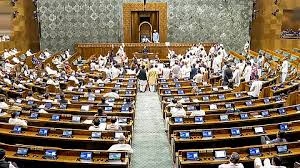The Narendra Modi-led Union government on Tuesday introduced three key bills in the Lok Sabha that propose the removal of the Prime Minister, Union ministers, chief ministers, and state or Union Territory ministers if they are arrested and detained for 30 consecutive days on serious criminal charges.
The Three Bills Introduced
As per the List of Government Business (August 20–21), the following bills were tabled:
- The Constitution (One Hundred and Thirtieth Amendment) Bill, 2025
- The Government of Union Territories (Amendment) Bill, 2025
- The Jammu and Kashmir Reorganisation (Amendment) Bill, 2025
Union Home Minister Amit Shah also moved a motion to refer the bills to a joint committee of Parliament for further examination.
Key Provisions
- If the Prime Minister, a Union minister, a chief minister, or a minister is arrested and detained for 30 consecutive days on charges carrying a potential sentence of five years or more, they would automatically cease to hold office from the 31st day.
- In the case of the Prime Minister, resignation must be tendered by the 31st day. If not, the position would automatically fall vacant.
- Similar provisions apply to Union ministers, state chief ministers, and ministers of Union Territories.
Currently, there is no legal bar preventing ministers or chief ministers from continuing in office after arrest. For instance, former Delhi CM Arvind Kejriwal and Tamil Nadu minister V. Senthil Balaji retained their posts after their arrests on different charges.
Objectives of the Bills
- Constitution (130th Amendment) Bill, 2025: Proposes amendments to Articles 75, 164, and 239AA to create a framework for removal of PM, Union ministers, CMs, and ministers in case of arrest.
- Government of Union Territories (Amendment) Bill, 2025: Amends Section 45 of the Government of Union Territories Act, 1963 to provide for removal of UT ministers and CMs.
- Jammu and Kashmir Reorganisation (Amendment) Bill, 2025: Amends Section 54 of the J&K Reorganisation Act, 2019 for similar provisions.
These amendments aim to bring uniformity across the Constitution, Union Territories law, and the J&K Reorganisation framework regarding removal of leaders facing serious criminal charges while in custody.
Existing Legal Position
Currently, under the Representation of the People’s Act, 1951, members of Parliament and state legislatures are disqualified if convicted with a sentence of two years or more. However, there is no such provision mandating resignation or removal upon arrest or detention before conviction.
Political Reactions
While the government has presented the move as a step towards strengthening accountability in public office, opposition parties have raised concerns about timing and possible implications. The matter is now set to be reviewed by the joint parliamentary committee for further discussion.

